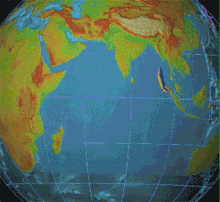Submissions/The role of Wikimedia in emergency response

|
This is an accepted submission for Wikimania 2017. |
- Submission no. 7038 - C5
- Title of the submission
- The role of Wikimedia in emergency response








- Type of submission (lecture, panel, tutorial/workshop, roundtable discussion, lightning talk, poster, birds of a feather discussion)
- workshop
- Author of the submission
- Daniel Mietchen
- Language of presentation
- English. Happy to take questions in French and other languages.
- E-mail address
- daniel.mietchen
 okfn.org
okfn.org
- Username
- User:Daniel Mietchen
- Country of origin
- Germany
- Affiliation, if any (organisation, company etc.)
- Personal homepage or blog
- https://twitter.com/EvoMRI
- Abstract (up to 300 words to describe your proposal)
When disaster strikes at scale, Wikimedia usually responds: articles are written or updated, media are uploaded and integrated into these articles, references are added, queries and front page items produced and so on. The question I'd like to address here is how we can respond more efficiently and in a way that can be more tightly integrated with emergency responses from other communities, both on the ground (e.g. the Red Crescent and Red Cross movements) and online (e.g. Ushahidi).
For example, OpenStreetMap have set up the Humanitarian OpenStreetMap Team (HOT) that "applies the principles of open source and open data sharing for humanitarian response and economic development." In practice, this means, for instance, that when an earthquake occurs, they have mechanisms to quickly receive and act upon high-resolution satellite imaging data that facilitates detailed mapping of the damage and of the situation of roads, hospitals and other infrastructure after the event, or even before it. Their maps of the area are often the best ones available for on-the-ground responders, and widely used even by traditional humanitarian organizations that otherwise do not engage much with open digital communities.
The session will start with an introduction, in which I will give a few concrete examples of Wikimedia responses to past emergencies (e.g. to the Ebola outbreak in West Africa), along with information on some of the problems that had to be addressed on the way. Workshop participants will then be asked to work in groups on strategies for
- more efficient responses
- to specific kinds of emergencies (e.g. earthquakes, floods, tsunamis, tornados, disease outbreaks, war or terror)
- by individual Wikimedia projects (e.g. Wikinews, Wikivoyage, Wikispecies) or organizations (e.g. Wikimedia Nepal, WikiProject Med)
- more efficient means of communication about the emergency
- within the Wikimedia community
- with the communities affected on the ground
- with other responders, digital or on the ground.
The outcomes of this session will then be fed back into various community channels to raise awareness of the challenges and opportunities in this space, and to help get the ball rolling in terms of implementing some of the ideas that come out of the session.
- What will attendees take away from this session?
Attendees will get an overview of the kinds of ways in which Wikimedia has been, is or could be involved in disaster response, and some concrete ideas on how they or their respective communities can help make the response to the next emergency better.
- Theme of presentation
- WikiCulture & Community
- For workshops and discussions, what level is the intended audience?
intermediate or advanced in either emergency response (e.g. humanitarian aid, disaster management, infectious diseases etc.) or Wikimedia (any of the Wikimedia projects).
- Length of session (if other than 25 minutes, specify how long)
- 55 minutes
- Will you attend Wikimania if your submission is not accepted?
- Yes.
- Slides or further information (optional)
- meta:Wikimedians for Disaster Response
- Notes
- Recent examples of Wikimedia involvement
- Ebola response (see James Heilman's talk earlier)
- Zika response
- e.g. Zika corpus on Wikidata
- integrating epidemiological data with Wikidata
- Earthquakes from this week
- 2017 Jiuzhaigou earthquake (Aug 8)
- 2017 Jinghe earthquake (Aug 9)
- What can we do to prepare for more effective Wikimedia responses?
- per wiki
- per WikiProject
- per chapter/ affiliate
- per language
- through external partners
- on the ground in affected/ high-risk areas
- globally, to help those in affected/ high-risk areas
- The examples are partly drawn from previous presentations I have given on data sharing in public health emergencies, but extend beyond both public health (e.g. environmental emergencies) and data sharing (e.g. translation efforts). My notes on the matter are being collected on GitHub.
- Special requests
- Is this Submission a Draft or Final?
|
This is a Completed submission for Wikimania 2017 ready to be reviewed by a member of the Programme Committee. |
Interested attendees
If you are interested in attending this session, please sign with your username below. This will help reviewers to decide which sessions are of high interest. Sign with a hash and four tildes. (# ~~~~).
- Susannaanas (talk) 04:29, 11 April 2017 (UTC)
- GastelEtzwane (talk) 12:34, 11 April 2017 (UTC)
- Ocaasi (WMF) (talk) 15:52, 12 April 2017 (UTC)
- Paju (talk) 00:10, 12 July 2017 (UTC)
- Andy Mabbett (Pigsonthewing); Talk to Andy; Andy's edits
- #TMorata (talk) 17:44, 4 August 2017 (UTC)
